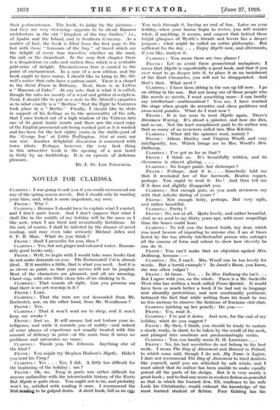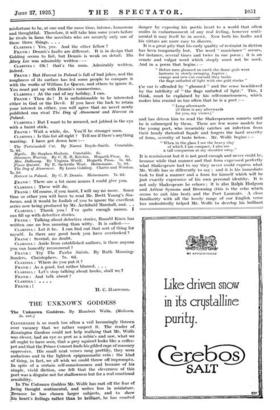NOVELS FOR CLARISSA
CLARISSA : I was going to ask you if you could recommend me any of the spring season novels. But I should only be wasting your time, and, what is more important, my own.
FRANK : Why ?
CLARISSA : Because I should have to explain what I wanted, and I don't quite know. And I don't suppose that what I shall like in the middle of my holiday will be the same as I like now, when I am tired and neurotically fastidious. At the end, of course, I shall be infected by the disease of novel reading, and may even take seriously Michael Arlen and S. P. B. Mais. What do you think ?
FRANK : Shall I prescribe for you, then ?
CLARISSA : Yes, but not ginger and coloured water. Reason- ably good books only.
FRANK : Well, to begin with I would take some books that do not make demands on you. The Tortoiseshell Cat is almost ideal. If it rambles a little, that is what you need. And it is as clever as paint, so that your nerves will not be jangled. Most of the characters are pleasant, and all are amusing. Claret cup, with nice little clean bits of ice clinking in it.
Cnikrussa. : That sounds all right. Can you promise me that there is no pet worship in it ?
FRANK : I can.
CLArussa. : That the men are not descended from Mr. Rochester, nor, on the other hand, from Mr. Woodhouse ? FRANK : Yes.
CLARISSA : That it won't send me to sleep, and it won't keep me awake ?
FRANK : Just so. It will amuse, but not torture your in- telligence, and while it reminds you of reality--and indeed of some phases of experience not usually treated with this amount of delicacy in print—at the same time it raises no problems and advocates no cause.
CLARISSA : Thank you, Dr. Johnson. Anything else of
the kind ? .
FRANK : You might try Stephen Hudson's Myrtle. Didn't you read his Tony ?
CLARISSA : Yes . . . Yes, I did. A little too difficult for the beginning of the holiday ; urn,?
FRANK : Oh, no. Tony in parts was rather difficult for anyone unfamiliar with the interminable history of the Kurts But Myrtle is quite clear. You ought not to be, and probably won't be, satisfied with reading it once. I recommend the first reading to be gulped down. A short book, full as an egg. You rush through it, having no end of fun. Later on your holiday, when your brains begin to revive, you will wonder what, if anything, it means, and suspect that behind these bright glimpses of Myrtle's friends and lovers lies a deeper purpose ; what might be called an entire philosophy. But sufficient for the day . . . Enjoy Myrtle now, and afterwards, if you like, analyse it.
CLARISSA : You mean there are two planes ?
FRANK : Let us avoid these geometrical metaphors. I mean that Myrtle is superficially a good book, and that if you ever want to go deeper into it, to place it as an instalment of the Kurt Chronicles, you will not be disappointed. And that's that. What next ?
CLARISSA : I have been sitting in the sun up till now. I go on sitting in the sun. But not being one of those people who like novels a> novels, I want something more—I can hardly say intellectual—mathematical ? You see, I have reached the stage when people do acrostics and chess problems and cross-word puzzles. What do I read now ?
FRANK : It is too soon to read Myrtle again. There's Streamers Waving. It's about a ,spinster, and how she dies, and so on. Not the least compliment paid to its author was that so many of us reviewers called him Miss Kitchin.
CLARISSA : What did the spinster read, mainly ?
FRANK : Aldous Huxley and Virginia Woolf, and very intelligently, too. Which brings me to Mrs. Woolf's Mrs. Dalloway.
CLARISSA : I've got as far as that ?
FRANK : I think so. It's beautifully written, and its cleverness is almost glaring. . . .
CLARISSA : No longer paint, but distemper ?
FRANK : Perhaps. And it is. . . . Somebody told me that it reminded her of fine lacework. Beaten copper, perhaps. You ought to read it. Do ! And then tell me if it does not slightly disappoint you.
CLARISSA : Not enough guts, as you male reviewers say with that infinite daring of yours ?
FRANK : Not enough body, perhaps. But very agile, and rather beautiful.
CLARISSA : Pretty ?
FRANK : No, not at all. Quite lovely, and rather beautiful. And, as we used to say thirty years ago, with more maquillage than the bones could bear.
CLARISSA : To tell you the honest truth, .my dear, which you must beware of repeating to anyone else, I am at times bored by the too utterly intellectualist person who outrages all the canons of form and colour to show how cleverly he can do it.
FRANK : You can't make that an objection against Mrs. Dalloway, because-- CLARISSA : No, I can't. Mrs. Woolf can be too lovely for words. But a horrid example ? In Jacob's Room, you know, she was often vulgar !
FRANK : At times. Yes. . . In Mrs. Dalloway she isn't. . But I agree with you, on the whole. There is a Mr. Sackville West who has written a book called Piano Quintet. It would have been so much better a book if he had not in language now absurdly pretentious, and now emotionally pertinent, betrayed the fact that while writing from his heart he was no less anxious to observe the fashions of feminine chit-chat, CLARISSA (picking up her pencil) : Do you— FRANK : Yes, read it.
CLARISSA : I've put it down. And now, for the end of my holiday, what do you suggest ?
FRANK : By then, I think, you should be ready to sustain a shock, ready, in short, to be taken by the scruff of the neck, and plunged into emotions not predominatingly erotic.
CLARISSA : You can hardly mean D. H. Lawrence. ...
FRANK : No, his last novelettes do not belong to his best work. I mean The Day of Atonement and Harvest in Poland, to which some add, though I do not, My Name is Legion. I dare not recommend The Day of Atonement to tired dentists like yourself, until you are refreshed by salt winds, and I must admit that its author has been unable to make equally potent all the parts of his design. But it is very nearly a great book ; and to find any scene in modern fiction as powerful as that in which the learned Jew, Eli, confesses to his wife Leah his Christianity, would exhaust the knowledge of the most learned student of fiction. Poor Golding has the
misfortune to be, at one and the same time, intense, humorous and thoughtful. Therefore, it will take him some years before he rivals in fame the novelists who are securely only one of these three things. . . .
CLARISSA : Yes, yes. And the other fellow ?
FRANK : Dennis's faults are different. It is in design that Golding seems to fail, but Dennis is weak on detail. His Mary Lee was admirably written- CLARISSA : Oh ! that's the man. Admirably written,
indeed.
FRANK : But Harvest in Poland is full of bad jokes, and the
roughness of its surface has led some people to compare it with the works of William Le Queux, and others to ignore it. You must put up with Dennis's mannerisms.
CLARISSA : At the end of my holiday, I can.
FRANK : Then do ! It is unfashionable to be interested either in God or the Devil. If you have the luck to retain your interest in either, you will agree that no novel newly published can rival The Day of Atonement and Harvest in Poland. • CLARISSA : But I want to be amused, not jabbed in the eye with a burnt stick.
FRANK : Wait a while, do. You'll be stronger soon. CLARISSA : Is this list all right ? Tell me if there's anything wanting. I have got down here :— ' The Tortoiseshell Cat. By Naomi Iloyde-Smith. Constable. 7s. 6d.
Myrtle. By Stephen Hudson. Constable. Gs. Streamers Waving. By C. H. B. Kitchin. Hogarth Press. Os. Mrs. Dalloway. By Virginia Woolf. Hogarth Press. 7s. 6d. Piano Quintet. By E. Saekvilla West. Heinemann. 7s. 6d. The Day of Atonement. By Louis Golding. Chatto and Windus. 7s. 6d.
Harvest in Poland. By G. P. Dennis. Heinemann. 7s. 6d.
FRANK : There arc a lot more names I could give you. CLARISSA : These will do.
FRANK : Of course, if you insist, I will say no more. Some time or other you will have to read Mr. Brett Youngs Sca- horses, and it would be foolish of you to ignore the excellent ,series now being produced by Mr. Archibald Marshall, and. .
CLARISSA : Thank you ! I've quite enough names. can fill up with detective stories.
FRANK : Talking about detective stories, Ronald Knox has
written one no less amusing than witty. It is called
CLARISSA. : Let it be. I can find out that sort of thing for myself. Is there any good book you have overlooked ?
FRANK : Several, no doubt.
CLARISSA : Aside from established authors, is there anyone you can honestly recommend ?
FRANK : Try The Twelve Saints. By Ruth Manning- Sanders. Christophers. 7s. 6d.
CLARISSA : 'Where do you put it ?
FRANK : As a good, but rather blurred... .
CLARISSA : Let's stop talking about books, shall we ? FRANK : And talk about ?
CLARISSA : • a . •
FRANK : ! Ii. C. ILutwooD.











































 Previous page
Previous page